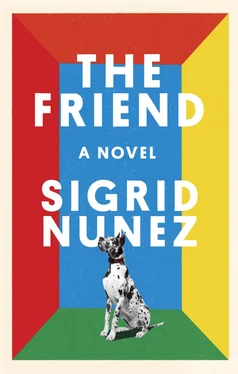As if Apollo doesn’t already know that. More than once when we’ve been out walking he’s decided we’ve walked enough. He stops and sits or lies down on the ground, and nothing I do can get him up again. I’m less angry with him than with the people who stop to watch and sometimes laugh. Once, a man, thinking to help, stood some distance away, patting his leg and whistling. Like rolling thunder came the response, new to my ears, and so menacing that the man and several other people nearby quickly crossed the street.
Whoever trained him made him understand that humans are the alphas, the vet says, and you don’t want him to start thinking otherwise. You don’t want him getting it into his head that he’s the alpha. When he leans against you, the way Danes do, stand your ground, don’t let him knock you over. Get him to lie on his back, spend a little time rubbing his chest. And for God’s sake, get yourself back on the bed and him on the floor. You train a dog by keeping him down.
My expression when I hear this clearly exasperates him.
He’s a good dog , he repeats, quite loudly this time. Don’t turn him into a bad one. A bad dog can easily turn into a dangerous one.
By the time he finishes examining Apollo and lecturing me, I like Grumpy Vet better. Though not so much his parting remark: Remember, the last thing you want is for him to start thinking you’re his bitch.
• • •
Now that I have Apollo I often think of Beau, the Dane-shepherd cross that belonged to the boyfriend I lived with when I was in my early twenties. Still a puppy when I first met him, he grew up to be almost but not quite as tall as a Dane and with many of a Dane’s traits but with a shepherd’s nerves and aggression. Big, unneutered, and very dominant, he hit the street like someone looking for a fight (and often, alas, finding one). Our apartment was in a dicey neighborhood, but so long as Beau was behind it we didn’t always bother to lock the door. I would take him with me to a friend’s place two miles away, stay until one or two in the morning, then walk back home along dark and empty streets. Beau knew about the potential danger, you could see it in his tension, his hypervigilance; he was like a fur soldier; he was cocked , like a soldier’s gun. More than once he terrified the wits out of some guy loitering on a corner, or in a building doorway. (I should say that few people I knew living in that part of town in those years had not been the victim of a mugging, or a burglary, or worse.) There was something undeniably thrilling about Beau’s rumbling barks and growls, the stance he took between me and whatever he saw as a threat (which included any strange man who so much as looked at me), the knowledge that he would defend me—to the death if he had to. It was all part of why I loved him.
Also, back then, I liked the way we attracted attention.
But things are different now. The city has calmed down, the streets are safe, and I don’t walk around late at night anymore anyway. At one or two in the morning I am asleep. I don’t need protection. I don’t need a badass dog to defend me. I don’t want Apollo ever to feel that he has to bark or growl at anyone. I don’t want him to worry. I don’t want him to be anxious. I want him to feel that we are both perfectly safe, no matter where we go. I don’t want him to be my bodyguard. I don’t want him to be my gun. I want him to chill. I want him to be Mr. Happy Dog.
• • •
He missed you, the woman who lives in the apartment above mine says.
Coming home from school, I ran into her at the elevator.
Meaning: Apollo is howling again.
• • •
He has to forget you. He has to forget you and fall in love with me. That’s what has to happen.
“Did you read about the Tibetan mastiffs?”
I had indeed read the article in the Times , and I say so, but the woman’s need to vent is too great: she tells the story anyway.
Only a few years ago, in China, the Tibetan mastiff was a status symbol, a luxury item priced at the equivalent of an average of $200,000 with some puppies said to sell for more than a million. As the mania peaked, more and more dogs were produced by grasping breeders. Then the mania died. Worth too little, eating too much, the huge and sometimes hard to control dogs were no longer wanted. What came next: Mass abandonment. Dogs packed into transport trucks, where they suffered horribly and many died. The slaughterhouse.
Truly, not a story I needed to hear twice.
The woman is someone we often meet when she’s out walking her own two dogs, gentle mutts, mother and daughter. From the news story she goes into her screed—it too is something she’s shared with me before—about the evils of dog breeding. Mutts are what nature intended, mutts are what should exist. But what’ve we got instead? Idiot collies, neurotic shepherds, murderous Rottweilers, deaf Dalmatians, and Labs so calm you could shoot a gun at them and they wouldn’t suspect danger. Fur vegetables, cripples, morons, sociopaths, dogs with bones too thin or flesh too fat. That’s what you get when you breed dogs for the traits people want them to have. It should be a crime. (I thought this woman was crazy when she told me about pointers that freeze in point posture and then can’t get out, but this grotesquerie turns out to be fact.)
I shudder to think what it’ll be like fifty or a hundred years from now, says the woman, looking very dark indeed. But by then, she adds, the whole earth will have been destroyed. And, perhaps consoled by this thought, she takes her mutts and moves on.
I am left thinking about the mastiffs. Besides their great bulk and a mane that makes them look part lion, they are known for being fiercely protective and loyal to their masters. So what does a dog bred for those traits feel when its master lets it be herded onto one of those transport trucks? Does a dog understand betrayal? I think probably not. I think the main thing on the mastiff’s mind, all the way to the slaughterhouse, is Who will protect Master now?
A digression. About animal suffering, what do we really know? There is evidence that dogs and other animals have a higher tolerance for pain than humans do. But their true capacity for suffering—like the true measure of their intelligence—must remain a mystery.
Ackerley believed that being so emotionally involved with people and trying forever to please them made a dog’s life chronically anxious and stressed. But did they get headaches? he wondered, not even that much about them being known.
Another question: Why do people often find animal suffering harder to accept than the suffering of other human beings?
Take Robert Graves, writing about the Somme: The number of dead horses and mules shocked me; human corpses were all very well, but it seemed wrong for animals to be dragged into the war like this.
Why, of all the terrible memories of his ordeal as a POW in Japan during World War Two, was Olympic athlete and US Army airman Louis Zamperini most haunted by the memory of a guard torturing a duck?
Of course, in each of these cases the suffering was caused by human behavior, in the case of the duck an act of pure sadism. But aren’t animals always at our mercy, and doesn’t the pity we feel for them have to do with our understanding that the animal itself has no way of knowing the reason for its pain (a fact that makes some people insist that animals must suffer even worse than humans do). I believe the intensity of the pity you feel for an animal has to do with how it evokes pity for yourself. I believe we must all retain, throughout our whole lives, a powerful memory of those early moments of life, a time when we were as much animal as human, the overwhelming feelings of helplessness and vulnerability and mute fear, and the yearning for the protection that our instinct tells us is there, if we could just cry loudly enough. Innocence is something we humans pass through and leave behind, unable to return. But animals live and die in that state, and seeing innocence violated in the form of cruelty to a mere duck can seem like the most barbaric act in the world. I know people who are outraged by this sentiment, calling it cynical, misanthropic, and perverse. But I believe the day when we are no longer capable of feeling it will be a terrible day for every living being, that our downward slide into violence and barbarity will be only that much quicker.
Читать дальше












